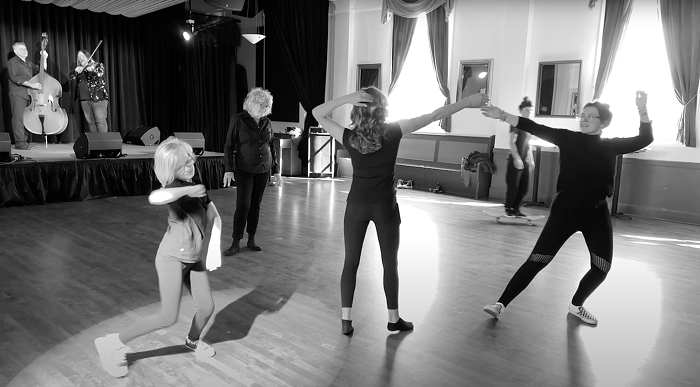It was last year, when Xtina released the single "Can't Hold Us Down," from her 2002 album Stripped--that's when she upset the clockwork. It was an inspirational anthem of girl-strength that called out the double standard. It was a revolt against the life-sucking notion that for a woman to do as a man does is impermissible, and punishable by scarlet letter. She addresses frustrations head on:
"If you look back in history
It's a common double standard of society
The guy gets all the glory the more he can score
While the girl can do the same and yet you call her a whore"
Her voice, steely and steady as ever, hammered two key phrases: the battle cry "Can't hold us down," followed by the kicker: "Shout louder!" Straight out, in the first verse, she names her fury and indignation:
"So what am I not supposed to have an opinion
Should I be quiet just because I'm a woman
Call me a bitch cos I speak what's on my mind
Guess it's easier for you to swallow if I sat and smiled?"
Xtina's boy detractors are not left out, either: she emasculates them via mocking allusions to teeny penises: "You must talk so big, to make up for smaller things." Here, Xtina equates manhood with those who respect and value a woman's right to behave as we choose, sexually and otherwise. An encouragement from a very powerful woman to "lift your hands high and wave them proud," for all the ladies toeing the shit-end of the magic stick.
THE RIOT GRRRL WAY
While it's important to like and understand a piece of music, sometimes that's not enough; with songs, as with human relationships, the most resonant moments come from actual connection--a real bond built on language or intent. The first time I heard "Can't Hold Us Down," on Portland's hiphop radio station, literally sandwiched between Ying Yang Twins and Lil' Jon, I was relieved of a burden I didn't even realize I was carrying. I'm a feminist, and yet, for all my affection for the songs on pop radio (even my contradictory love for Ying Yang Twins and Lil' Jon), at that moment, this song re-emphasized the dearth of whole lady voices whose messages are not based on the male-approval merry-go-round, or the basic but ultimately unsatisfying power of the dollar (which Xtina's chief sisters-in-arms, Destiny's Child, often used as a feminist jump-off). I realized I'd forgotten what it felt like to feel represented so wholly by the radio. And I didn't have to seek it out.
I hadn't felt this deliberately included in such a personal/universal statement since hearing Bikini Kill for the first time. During my brief imprisonment in a Cheyenne, Wyoming high school, Bikini Kill verbalized the things I knew to be true, but what the male punks in my record collection had neglected to name. That band split my world open like a geode; 11 years later, speaking from the anonymous corridors of corporate FM radio, Xtina Aguilera did the same.
Xtina and Bikini Kill: it's not a strenuous analogy. In the early '90s, Bikini Kill spearheaded "riot grrrl," an incendiary microcosm of third-wave feminism, as a revolutionary counterpoint to the male-dominated punk underground. Xtina, a self-avowed feminist, has attacked the barbed wire of gender status quo for years; but finally, with "Can't Hold Us Down," Xtina imagines a real alternative to the absolute, never-ending truth of the male-dominated airwaves. In an absence of dynamic, her outline of self is firm; she refuses to be sealed frozen in the Tupperware of her supposedly predetermined role as female pop artist. She reconciles the contradictions of what Bikini Kill termed "Alien She," as in her own deliberate text:
"It's sad you only get your fame through controversy
But now it's time for me to come and give you more to say"
She embraces her complexity; Xtina's persona, her lyrics, personal action and participation--and, most importantly, the ways in which she self-identifies and lives her message--are parallel to those of Bikini Kill. Xtina's girl-might embodies the collective mentality of riot grrrl, with all its confrontation and self-determination. Spouting lyrics that could have been ripped from the pages of Bikini Kill fanzine, Xtina Aguilera takes Riot Grrrl ideals to mass market, promoting revolutionary concepts through traditional means of the capitalism so hated by RG.
As the riot grrrl movement tapered off through the '90s, their primary meme, "girl power," was appropriated by Xtina's forebears in the form of UK teen-pop flash-in-the-pans Shampoo and the Spice Girls. (You could probably call Shampoo and the Spice Girls Xtina's elder aunties.) Eventually, the phrase, stripped of its ideals and demeaned by sheer capitalism, became, simply, the thing printed on bumper stickers and baby tees. Freed of the phrase, Xtina again infuses the concept with meaning, in broad daylight of what Bikini Kill's Kathleen Hanna deemed the "bullshit Christian Capitalist Way of doing things." With "Can't Hold Us Down," Xtina politicizes the turf of the willfully depoliticized. And they have to let her do it, because, as the third-best selling American artist of 2003 (right after 50 Cent and Justin Timberlake), she is what the people want. She is what the people will pay for.
Could this be new radio?
As Hanna wrote in the "riot girl" manifesto, printed in 1991 in issue two of Bikini Kill fanzine: "We hate capitalism in all its forms and see our main goal as sharing information and staying alive, instead of making profits off being cool according to traditional standards." While Christina profits from "Can't Hold Us Down," she's sharing information to stay alive, effectively using her cool codification power--indeed, perhaps the most power, as Stripped has sold over 10 million copies worldwide--to put forth what is still a nontraditional standard in pop music: the humanization, validation, and three-dimensionalization of women.
VICTIM NO MORE
The media has depicted Xtina in a mono-faceted light: as drrty, and drrty only. The resolute immediacy of "Can't Hold Us Down," and the incredulity of Xtina's delivery, while amazing, comes as if she is just awakening to this notion, in that raw, newborn-baby space. And in a way, she has--her revamped persona, a departure from the youthful Mickey Mouse Club sweetheart who sang "Genie in a Bottle," is perhaps a reaction to the media's old mono-faceted depiction of her. It is as though it has just dawned on her that these machinations were not designed with her in mind, and that she will not "stand her whole life on trial" for choosing a life outside the realm of normative acceptable behavior. She will not keep silent.
And she knows from staying alive. Suffering her father's abuse and violence throughout her childhood, opening up in interviews about being five years old and her dad punching her in the face because she was making too much noise, she uses Stripped as a conduit to, bravely, bring her own experience to light. She found reprieve in music, escaping the violence of her situation through singing. Yet these stories are relegated to secret corners, superceded in media by the age-old divisive tactics: pitting her against Britney, naming her a "whore" or "slut," obsessing over her fashion sense.
Yet, she refuses to be victimized. About her father, she told Blender "I've suffered too much hurt in my life to be in that place again. I'm through being the victim." And, as though reaching her hand out to the ladies fallen in the thrust of a pit, she extends her own monetary and emotional presence to domestic violence safe-houses, donating money and spending personal time talking to the ladies. (Most recently, she visited and donated $200,000 to The Women's Center and Shelter of Greater Pittsburgh). DIY community outreach.
DRESS AGGRESSIVE
Her absolute denial of victimization, and as a self-described feminist, includes her "drrty" side. In a 2004 interview with Australian Cosmo, she said, "I have no apologies and I see nothing wrong with what I'm doing. In fact, I think my record, if you listen to it, has a lot of extremely positive messages in it, especially for women. I think it's great. And it takes some people time to get used to new ideas, or something they can't or aren't open enough to want to understand."
"If a man does this kind of thing, he's allowed to get away with it. If a woman does it, she's labeled a slut or whatever. That's not going to stop me. I'm just going to show that it's the wrong way of thinking."
On Stripped (which, by the way, out of 20 songs, only two are quote-unquote "pornographic" as the All Music Guide and others deemed them) and in manner of dress, it's how she relates to her sexuality that is most interesting. Her ensembles traverse between butchy-butch and vampy-vamp, but she's not wearing traditionally sexy clothes: while her outfits are revealing, she kind of dresses like a confrontational pirate. Lenny Kravitz shows the same amount of skin as Xtina, and shares her fashion sense. More accurately, one could describe her own image and fashion as aggressive, which is probably more off-putting to the same folks who made, say, Jennifer Lopez a star for showing a demurely feminine outburst of cleavage. It's almost as if Xtina uses her manner of dress as "a challenge and a promise," in riot grrrl parlance.
When Cosmo gingerly, indirectly asked Xtina about her image, she came correct and direct: "How do I not be exploited whilst selling my sexuality? For me it's a matter of opinion about how far is too far. I'm not too bothered if some people get upset about what I wear... with my videos and my pictures of me, I am not an object. I am in control. I'm in the power position. I decide who I am and it's too bad if you don't get it... or want it."
Like Kathleen Hanna patrolling the stage with the word "slut" scrawled across her belly, Xtina owns her sexuality, recalcitrant and unflinching. As Bikini Kill wondered in the song "I Like Fucking," "Just 'cause my world is so fucking goddamn full of rape, does that mean my body must always be a source of pain?" (In certain ways, this is still the last frontier of the third wave: reconciling our right to be sexual--and more specifically, how we are sexual--with our right to name ourselves as feminists, exercising agency and personal will outside of the bounds of patriarchal, harmful-to-everyone mores.)
And yet: Xtina's complexities are ignored by a moralizing and uncurious media. Recent headlines include a biting Fort-Worth Star Telegram story about her fashion sense, a review in the Akron Beacon Journal which describes Xtina as possessing "the fashion sense of a well-financed streetwalker," and a New York Daily News article, entitled "Crazy Divas and Pop Tarts," that noted "she may be 'Beautiful,' but Christina has a slightly skewed vision of what it means to be attractive."
In the most charming little snip, the BBC included her in a game entitled, "Slap 'Em or Snog 'Em." They posed the question "Slap 'Em or Snog 'Em?" to the four-boy band Blue, wondering if Christina would be good enough for punching or fucking.
Her sole voices of defense, it seems, are her fans--proving that people are getting it, and as Xtina grows up and carries her increasing depth of image and message of feminism, so do young women find the role model in the liner notes. (Even pressed into margins, we will always find ways to communicate.) This January, readers of UK teen mag Sugar voted Xtina as best role model for teenage girls; expressing their allegiance on blogs, websites, and the comments section of amazon.com, her message is not lost.
Echoing the Helen Reddy's second-wave feminist flagship song, "I Am Woman," exhibiting the strength of Bikini Kill's "Rebel Girl," Xtina's "Can't Hold Us Down" is a valuable and important moment for feminist pop music. As Xtina told Cosmo, "I am much stronger than I look; anger can give me incredible strength. Energy often comes out of dark periods." Kept silent long enough, Xtina's got the conch, and she wields the voice. In the realm of pop music, she could be our greatest hope. In the same way that communication begat riot grrrl, so too could Xtina's power help transform an explicit, young feminist dialogue worldwide.


















